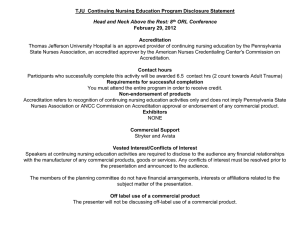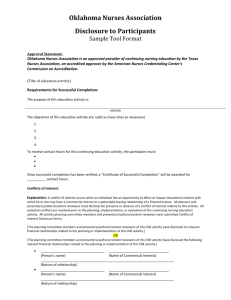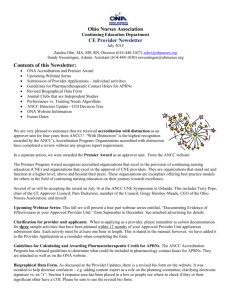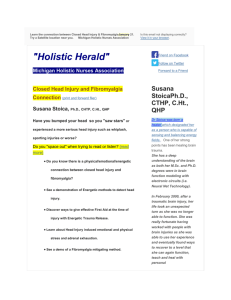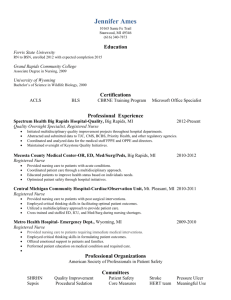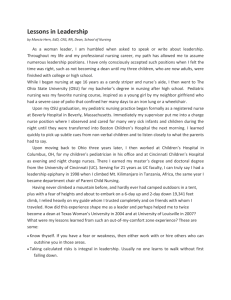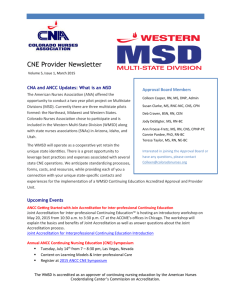Glossary - Connecticut Nurses Association
advertisement
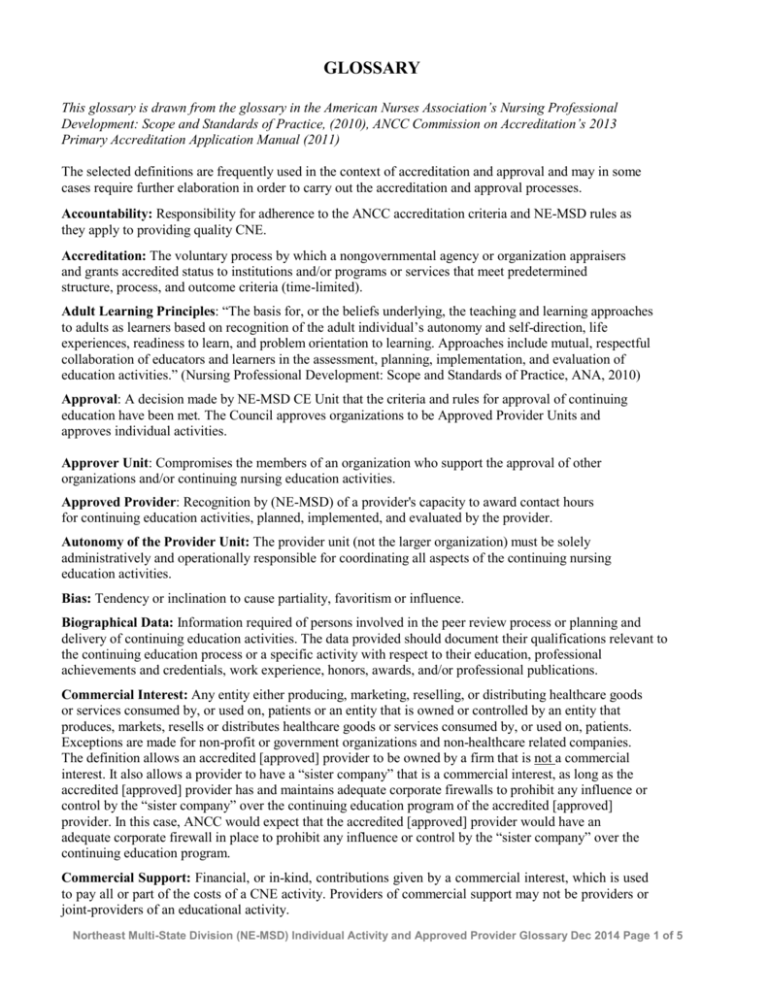
GLOSSARY This glossary is drawn from the glossary in the American Nurses Association’s Nursing Professional Development: Scope and Standards of Practice, (2010), ANCC Commission on Accreditation’s 2013 Primary Accreditation Application Manual (2011) The selected definitions are frequently used in the context of accreditation and approval and may in some cases require further elaboration in order to carry out the accreditation and approval processes. Accountability: Responsibility for adherence to the ANCC accreditation criteria and NE-MSD rules as they apply to providing quality CNE. Accreditation: The voluntary process by which a nongovernmental agency or organization appraisers and grants accredited status to institutions and/or programs or services that meet predetermined structure, process, and outcome criteria (time-limited). Adult Learning Principles: “The basis for, or the beliefs underlying, the teaching and learning approaches to adults as learners based on recognition of the adult individual’s autonomy and self-direction, life experiences, readiness to learn, and problem orientation to learning. Approaches include mutual, respectful collaboration of educators and learners in the assessment, planning, implementation, and evaluation of education activities.” (Nursing Professional Development: Scope and Standards of Practice, ANA, 2010) Approval: A decision made by NE-MSD CE Unit that the criteria and rules for approval of continuing education have been met. The Council approves organizations to be Approved Provider Units and approves individual activities. Approver Unit: Compromises the members of an organization who support the approval of other organizations and/or continuing nursing education activities. Approved Provider: Recognition by (NE-MSD) of a provider's capacity to award contact hours for continuing education activities, planned, implemented, and evaluated by the provider. Autonomy of the Provider Unit: The provider unit (not the larger organization) must be solely administratively and operationally responsible for coordinating all aspects of the continuing nursing education activities. Bias: Tendency or inclination to cause partiality, favoritism or influence. Biographical Data: Information required of persons involved in the peer review process or planning and delivery of continuing education activities. The data provided should document their qualifications relevant to the continuing education process or a specific activity with respect to their education, professional achievements and credentials, work experience, honors, awards, and/or professional publications. Commercial Interest: Any entity either producing, marketing, reselling, or distributing healthcare goods or services consumed by, or used on, patients or an entity that is owned or controlled by an entity that produces, markets, resells or distributes healthcare goods or services consumed by, or used on, patients. Exceptions are made for non-profit or government organizations and non-healthcare related companies. The definition allows an accredited [approved] provider to be owned by a firm that is not a commercial interest. It also allows a provider to have a “sister company” that is a commercial interest, as long as the accredited [approved] provider has and maintains adequate corporate firewalls to prohibit any influence or control by the “sister company” over the continuing education program of the accredited [approved] provider. In this case, ANCC would expect that the accredited [approved] provider would have an adequate corporate firewall in place to prohibit any influence or control by the “sister company” over the continuing education program. Commercial Support: Financial, or in-kind, contributions given by a commercial interest, which is used to pay all or part of the costs of a CNE activity. Providers of commercial support may not be providers or joint-providers of an educational activity. Northeast Multi-State Division (NE-MSD) Individual Activity and Approved Provider Glossary Dec 2014 Page 1 of 5 Commission on Accreditation (COA): Appointed by and accountable to the ANCC Board of Directors, this body is responsible for development and implementation of the ANCC program for accreditation of continuing nursing education. The Commission is composed of at least 9 members selected from CNE stakeholder communities such as accredited organizations, consumers, nursing evaluation, and adult education. Commitment: Duty or responsibility of those providing or approving continuing education to meet learner needs, provide quality CNE, and support Provider Unit goals and improvements. Conflict of Interest: An affiliation or relationship of a financial nature with a Commercial Interest Organization that might bias a person’s ability to objectively participate in the planning, implementation or review of a learning activity. All planners, content reviewers and faculty/presenters/authors are required to complete Biographical/Conflict of Interest forms. Contact Hour: A unit of measurement that describes 60 minutes of an organized learning experience. One contact hour = 60 minutes. Content: “Subject matter of an educational activity that relates to the educational objectives.” (Nursing Professional Development: Scope and Standards of Practice, ANA, 2010) Content Expert: An individual with documented qualifications demonstrating education and/or experience in a particular subject matter. This person is included on the planning committee of individual activities. Content Reviewer: An individual selected to evaluate an educational activity during the planning process or after it has been planned but prior to delivery to learners for quality of content, potential bias, and any other aspects of the activity that may require evaluation. Continuing Education Activities: Those learning activities intended to build upon the educational and experiential bases of an individual for the enhancement of practice, education, administration, and research or theory development, to the end of improving the health of the public. Continuing Education Unit: (CEU) The ANCC Accreditation Program does not utilize this term when referring to the CNE unit of measurement. The CEU is an educational measurement utilizing criteria of the International Association for continuing Education and Training (IACET). Continuing Nursing Education (CNE) activities: Those learning activities intended to build upon the educational and experiential bases of professional RN for the enhancement of practice, education, administration, research or theory development, to the end of improving the health of the public and RN’s pursuit of their professional career goals. Joint-Providership: Planning, developing, and implementing an educational activity by two or more organizations or agencies. Joint-provided Activities: Educational activities planned, developed, and implemented by 2 or more organizations or agencies. Credentialing: A generic term for licensure, certification, and registration. It can also be used as a term for a voluntary process under the auspices of private-sector associations. Educational Design: A plan for instruction documenting a needs assessment, description of the target audience, educational objectives, content outline, teaching methods, evaluation strategies, and designation of appropriate physical facilities and resources. Educational Objective: Derived from the overall purpose of the activity, educational objectives are written statements that describe learner-oriented outcomes that may be expected as a result of Northeast Multi-State Division (NE-MSD) Individual Activity and Approved Provider Glossary Dec 2014 Page 2 of 5 participation in the educational activity. These statements describe knowledge, skills, and/or attitude changes that should occur upon successful completion of the educational activity. Eligibility: An applicant’s ability to meet certain criteria in order to be considered qualified to apply for approval. Enduring Materials: A non-live continuing nursing education (CNE) activity that “endures” over time. Examples of enduring materials include programmed texts, audio tapes, videotapes, monograph or computer assisted learning materials, or other electronic media that are used alone or with printed or written materials. Enduring materials can also be delivered via the Internet. The learning experience by the nurse can take place at any time in any place, rather than only at one time or one place. Evaluation: A systematic process by which a judgment is made about consequences, results, effects, or merit of a continuing education provider unit or continuing education program in order to make subsequent decisions. The process of determining significance or quality by systematic appraisal and study. Gift“in-kind”: Non-monetary support (e.g. marketing assistance, meeting room, event registration assistance, etc.) provided by the giver to the taker. (In the Accreditation community, the “taker” is the provider of the continuing education.) In-service Education Activities: Activities intended to assist the professional nurse to acquire, maintain and/or increase competence in fulfilling the assigned responsibilities specific to the expectations of the employer. Key Personnel: Individuals who contribute to the overall functioning of the Provider Unit in a substantive, measurable way, without regard to pay or employment status. Lead Nurse Planner: Individuals who contribute to the overall functioning of the Provider/Approver Unit in a substantive, measureable way, without regard to pay or employment status. Leadership: The provision of direction and guidance to individuals involved in the process of assessing, planning, implementing and evaluating CNE activities in adherence to the ANCC criteria and OBN rules. Learner Directed, Learner Paced Activity: A learning activity in which the learner takes the initiative in identifying his or her learning needs, formulating learning goals, identifying human and material resources for learning, choosing and implementing appropriate learning strategies, and evaluating learning outcomes. The learner also determines the pace at which the learning activity is engaged. Learner–directed activities may be developed with or without the help of others, but they are engaged in by only one individual. Marketing Materials: Method of announcing an educational activity. This may include a brochure, flyer, bulletin board announcement, newsletter, memo, email, Intranet posting, electronic message or web site. Monitor: To periodically assess and evaluate continuing compliance with the criteria and operational requirements. Multi-Focused Organization (MFO): An organization that exists for more than the purpose of providing education. Need: Discrepancy between what is desired and what exists. Needs Assessment: The process by which a discrepancy between what is desired and what exists is identified. Nurse Peer Review Leader: A currently licensed RN with a master’s degree or higher, and with either the baccalaureate or graduate degree in nursing, who has the authority within the organization to evaluate adherence to the ANCC Accreditation Program criteria in the provision of CNE. Nurse Peer Reviewer: A currently licensed RN with a baccalaureate degree or higher in nursing who is actively involved in evaluating each Approved Provider or Individual Activity Applicant to evaluate Northeast Multi-State Division (NE-MSD) Individual Activity and Approved Provider Glossary Dec 2014 Page 3 of 5 adherence to the ANCC criteria. Nurse Planner: A currently licensed RN with a baccalaureate degree or higher or international equivalent in nursing who is actively involved in all aspects of planning, implementation, and evaluation of each CNE activity. The Nurse Planner is responsible for ensuring that appropriate educational design principles are used and processes are consistent with the requirements of the ANCC Accreditation Program. Nursing Professional Development: “The lifelong process of active participation by nurses in learning activities that assist in developing and maintaining their continuing competence, enhancing their professional practice, and support achievement of their career goals.” (Nursing Professional Development: Scope and Standards of Practice, ANA, 2010) Objective: see Educational Objective. Organizational Chart: A diagram or other schematic used to depict informal and formal lines of communication and relationships within the overall organization as well as the Approver and/or Provider unit. Outcome: The impact of structure and process on the organization as a provider and the value/benefit to nursing professional development. Outcome Measurement: “The process of observing, describing and quantifying predefined indicators of outcomes of performance.” (Nursing Professional Development: Scope and Standards of Practice, ANA, 2010) Planning Committee: At least 2 individuals responsible for planning each educational activity; one individual must be a Nurse Planner and one individual must have appropriate subject matter expertise. Position Description: Description of the functions specific to the role of the Lead Nurse Planner, Nurse Peer Review Leader, Nurse Peer Reviewers, Primary Nurse Planner, and key personnel that relate to the Provider or Approver Unit. Primary Nurse Planner: A currently licensed RN with a baccalaureate degree or higher in nursing who is designated as the Primary Nurse Planner and serves as the liaison between the ANCC Accredited Approver Unit and the Approved Provider Unit. The Primary Nurse Planner has the authority within an Approved Provider Unit to ensure adherence to the Accredited Approver Unit criteria in the provision of CNE. Process: For Accredited and Approved Providers, Process is the development, delivery and evaluation of CNE activities. For Accredited Approvers, process is the evaluation of providers of CNE and/or individual CNE activities. Provider: An individual, institution, organization, or agency responsible for the development, implementation, evaluation, financing, record keeping, and quality of CNE activities. Provider Unit: Comprises the members of an organization who support the delivery of continuing education activities. Provider-Directed, Learner-Paced: An educational activity in which the provider controls the content of the learning activity, including the learning objectives based on needs assessment, the content of the learning activity, the method by which it is presented, and the evaluation methods. The learner determines the pace at which the learning activity is engaged (examples include print article, self-learning module/independent study). Provider-Directed, Provider- Paced: An educational activity in which the provider controls all aspects of the learning activity. The provider determines the learning objectives based on needs assessment, the content of the Northeast Multi-State Division (NE-MSD) Individual Activity and Approved Provider Glossary Dec 2014 Page 4 of 5 learning activity, the method by which it is presented, and evaluation methods (examples include live activities, live Webinars). Purpose: Written outcome statement related to what the learner will be able to do at the conclusion of the activity (i.e., “The purpose of this activity is to enable the learner to…”) Relevant Relationship: A relationship with a commercial interest is considered relevant if the products or services of the commercial interest are related to the content of the educational activity. Financial relationships with any commercial interest of the individual’s spouse/partner are considered to be relevant relationships. Resources: Available human, material and financial assets used to support and promote an environment focused on quality CNE and outcome measures. Retroactive Approval: Peer review and approval of an activity that has already taken place; is not authorized in the ANCC Commission on Accreditation. Single-focused Organization (SFO): An organization that exists for the sole purpose of providing CNE. Specialty: A concentration in an area of nursing that has standards and that reflects a well-defined base of knowledge within the overall discipline of nursing. Specialty Nursing Organization (SNO): A national nursing body that has a majority of voting members who are RNs practicing in a specialized nursing area, as so defined in the organization’s governing documents. Sponsor: An organization providing financial or in-kind contributions that does not meet the definition of a commercial interest. Sponsorship: Financial or in-kind contribution from an organization that does not fit the category of a commercial interest. Structure: Characteristics of an organization, including commitment, accountability, leadership, and resources that are required to support the delivery of quality CNE. Target Audience: A group for which an educational activity has been designed. Teaching Strategies: Instructional methods and techniques that are in accord with principles of adult learning. Unique Identifier: Something that is used to match an individual with a recordkeeping list for an individual educational activity. Northeast Multi-State Division (NE-MSD) Individual Activity and Approved Provider Glossary Dec 2014 Page 5 of 5
